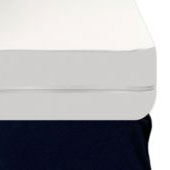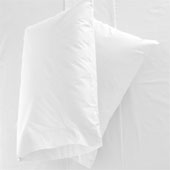Your Cart is Empty
Bed Bugs: Tips and Advice

I thought bedbugs were a problem of the post. >>
What can I do to keep from getting bedbugs? >>
I had the exterminator come but bedbugs keep coming back...what else can I do? >>
Is the only solution to bedbugs to get rid of the mattress? >>
How do you get bedbugs? >>
What do bedbugs look like? >>
How do bedbug covers work? >>
What kind of bed bug cover should I get? >>
How long do I have to leave a cover on? >>

I thought bedbugs were a problem of the past.
You may have heard recent stories about bedbugs coming back in epidemic levels. Through increased travel and the decreased use of pesticides, bedbugs are on the rise again. Today, as many as 90% of pest controllers report receiving calls about bedbugs. Unfortunately, many hotels are becoming infested, putting customers at risk of being bitten or worse, bringing bedbugs home. Fear not, however, as there are ways to protect yourself and your bedding.

What can I do to keep from getting bedbugs?
Prevention:
- Cover all mattresses, box springs, and pillows before an infestation occurs. This prevents the bedbugs from hiding out in your bed.
- Keep in mind that bedbugs can spread through common air ducts or spaces, so apartments, condos, and townhomes are more susceptible to infestations.
Traveling:
- NEVER place luggage on the carpet or bed. ALWAYS use the luggage rack – it is there for a reason!
- Be sure to check for signs of bugs – lift up the corner of the sheet and look on the edge of the bed near the seam for any dropping or exoskeletons (they shed!)
- Wash all items in hot water when you return to kill any bedbugs that may have come home with you.
- If it is winter and below freezing, consider leaving your bag outside to freeze any remaining bugs.
Treating:
- If you do get bedbugs, don’t think that tossing the old mattress will get rid of all bugs. An female adult bedbug can lay up to 200 eggs in her lifetime.
- Vacuum thoroughly and promptly dispose of the vacuum bag in a sealed bag outdoors.
- Cover your new mattress because often, bedbugs come back.
- Make sure your exterminator uses an old-fashioned bug spray, not bait, as bedbugs are blood feeders and do not take bait.
The best treatment is prevention, so it is best to cover your bedding and take precautions when traveling.

I had the exterminator come but bedbugs keep coming back…what else can I do?
If you have already had an exterminator come, but the bugs are not gone, it is probably because you have eggs remaining in your home. Sprays kill living bugs, but bedbugs lay hundreds of eggs, making them particularly difficult to get rid of.
If you have bedbugs, be sure to cover all mattresses, box springs, pillows, and non-washable comforters to encase the bugs. This will prevent new bugs from getting in and old bugs from getting out. Covers should be used for at least 1 year after getting bed bugs.
Any bedding you do not encase (sheets, mattress pads, blankets, washable comforters) should be washed in HOT water to kill any bugs and destroy the eggs. This should continue to be done every 2 weeks until you no longer see bugs and then periodically.
Finally, vacuum your entire house thoroughly, including carpets, draperies, wall hangings, couches, and any other fabric items to sweep up any bugs or eggs. Then, promptly remove the bag and place it in a sealable bag, dispose of it in an outdoor trashcan.
If you follow these few easy steps in conjunction with an exterminator’s treatment, you should be able to get rid of bedbugs.

Is the only solution to bedbugs to get rid of the mattress?
In short, no. In fact, just tossing the mattress may not rid you of the bedbug problem. Instead of getting rid of the mattress, you can encase it in a bedbug proof cover to trap bugs already there and keep new ones from settling in.
Be sure to cover all mattresses in the entire residence as well as box springs, pillows, and comforters to be sure you have removed any habitats. If you do choose to throw away your old mattress, you should cover your new mattress to ensure any residual bugs don’t get in and wreck your new investment.

How do you get bedbugs?
You can pick up bedbugs from just about anywhere. There are reports of infestations in malls, schools, subways, and hotels. By bringing home a single female bedbug, you can get as many as 200 new bedbugs in one generation. Bedbugs are also know for traveling through central air systems so multi-family residences like apartments are especially susceptible. Typically, if one room in a hotel or apartment gets bedbugs, the entire building will eventually acquire the bugs. The best way to protect yourself is to encase all bedding that cannot be washed and vacuum and wash the other items frequently.

What do bedbugs look like?
Bedbugs are about 1/5 of an inch long and oval shaped. They are brown unless they have recently fed, in which case they may appear dark red. They resemble an apple seed. Bedbugs molt about 5 times in their life, so you are more likely to see their leftover shell than the actual bug. Their eggs are almost impossible to see with the naked eye and appear like a speck of dust on a dark surface. Bed bug bites often appear as other bug bites. The best ways to differentiate between a bedbug bite and a mosquito bite are:
- Are the bites in a line?
- Are the bites on your torso?
- Are your bites in the winter?
- Do they appear in the morning?
If you have answered “yes” to any of those questions, your bites may be from bed bugs. Check your sheets for reddish brown marks which are tell-tale signs of squished bedbugs. Also, check the seam of your bed for any molted shells or dark droppings. You could have bed bugs.

How do bedbug covers work?
Bedbug covers work by trapping bedbugs you already have and preventing new ones from getting in. This keeps the bugs from nesting in your bed and keeps you bite free. Bedbug covers MUST have a zipper to be effective.

What kind of bed bug cover should I get?
We offer two kinds of bedbug covers. The least expensive bedbug covers are plain vinyl encasements. We recommend heavy duty vinyl for bedbugs as you must have your mattress encased for at least 1 year to prevent a relapse. The 6 gauge covers are more durable than the thinner 3 gauge covers and hold up better. While vinyl is economical, it is not as comfortable to sleep on because it does not breathe and can be loud. Vinyl is best for the box springs which are not slept directly on, although many people use vinyl covers for their top mattress as well. If you choose a vinyl encasement, you may want to get a plush mattress pad to provide some ventilation between you and the vinyl.
A more preferred option for mattresses is to use a premium encasement. Premium encasements are a urethane cover with a terry-loop top which provide breathable and comfortable mattress protection. These are the best bedbug covers because they provide reliable coverage, comfortable breathability, and last a very long time. Our premium covers carry a 10 year warranty. We also carry premium pillow and duvet covers to protect your entire bed.

How long do I have to leave a cover on?
You must leave your bed bug encasement on for at least 1 year to ensure all bugs AND EGGS have died before removing your encasement. This is another reason you may want to invest a little more in a premium cover. You will be sleeping on it for a long time.
